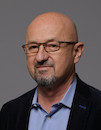Radiofrequency System Design
Data is displayed for academic year: 2023./2024.
Lecturers
Course Description
This course presents a selection of advanced topics related to modern microwave and wireless communications technologies:
- Microwave oscillator design: frequency stability, phase noise origins, analysis, phase-noise measurement, and approaches to building low-phase-noise oscillators.
- Microwave amplifiers for use with high bandwidth-efficiency modulations: analysis of non-linearity, digital pre-distortion (DPD), feed-forward (FF) amplifiers, achieving linearity.
- High-power microwave amplifiers: power combining, synchronization, high-power RF system passive and active components (switches, limiters, junctions, directional couplers), and linear amplification with non-linear elements.
- Microwave modulation and demodulation technology, homodyne and heterodyne detection, polyphase receivers, software-defined radio technology.
- Antenna impedance and polarization matching, antenna aperture efficiency, phased array antennas and MIMO systems with emphasis on the RF front end.
- Advanced topics in thermal design and management of microwave and RF amplifiers.
*** The course includes lectures and individual consultation, and one practical project that may include one or more of design (simulations), building a circuit, and characterizing it - topic to be decided between the teacher and student on an individual basis.
Study Programmes
Postgraduate doctoral study programme
Literature
For students
General
ID 155177
Winter semester
6 ECTS
L2 English Level
L1 e-Learning


 Pristupačnost
Pristupačnost
